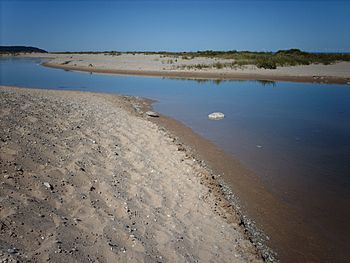Platte River (Michigan) facts for kids
Quick facts for kids Platte River |
|
|---|---|

Platte River, near Lake Michigan
|
|
| Country | United States |
| State | Michigan |
| Physical characteristics | |
| Main source | Lake Dubonnet 44°41′07″N 85°47′57″W / 44.68528°N 85.79917°W |
| River mouth | Lake Michigan Platte River Point at Platte Bay 44°43′54″N 86°09′10″W / 44.73167°N 86.15278°W |
The Platte River is located in the northern part of the Lower Peninsula of Michigan. Its mouth is located in Sleeping Bear Dunes National Lakeshore and much of the rest is in the Pere Marquette State Forest.
The Platte River is about 29.5 miles (47.5 km) in length from its origin at the outlet of Lake Dubonnet. The watershed area is about 193 square miles (500 km2). The land coverage is 82% forested, open lands or wetlands; 12% agriculture, and 7% urban. Approximately three-quarters of the watershed is publicly owned lands. Water in the river is clear due to extensive wetlands. Mixed conifer and hardwood wetlands give way to tamarack and arborvitae swamp near Big Platte Lake and Little Platte Lake.
The Platte River originates from Long Lake in Grand Traverse County flowing southwest into Lake Dubonnet, and then flowing west and eventually turning north, flowing into Mud Lake and then into Lake Ann. From the east, additional drainage into Lake Ann comes from Ransom Creek, which drains Ransom Lake, and in turn Bellows Lake and Lyons Lake. From Lake Ann, the Platte River runs west and south. It collects the outflow of Upper and Lower Woodcock Lakes then flows through Bronson Lake. The river continues southwest. The Platte River State Fish Hatchery is on the river at Platte Creek, Michigan and Brundage Creek joins the river just to the east. The main branch receives Collison Creek just east of Honor, Michigan. At the Platte River Campground in the state forest, the river turns north west flowing toward Platte Lake.
The north branch of the Platte River receives the outflow of Little Platte Lake shortly before joining the main branch just before the combined flow enters Big Platte Lake.
The lower part of the Platte River begins as the outflow of Platte Lake, south of Empire, Michigan. It runs generally northwest, widening into Loon Lake about a third of the way through its course from Platte Lake. Its mouth is at Platte Bay of Lake Michigan at Platte River Point. Mud Lake is a tributary upstream of Loon Lake.
There are three boat launches, a canoe launch and three picnic areas on the river in the national lakeshore.
The river above Platte Lake tends to be much swifter and colder than the lower stretch, which is warmed considerably by it passage through the relatively shallow, 3-mile (4.8 km) stretch of Platte Lake.

